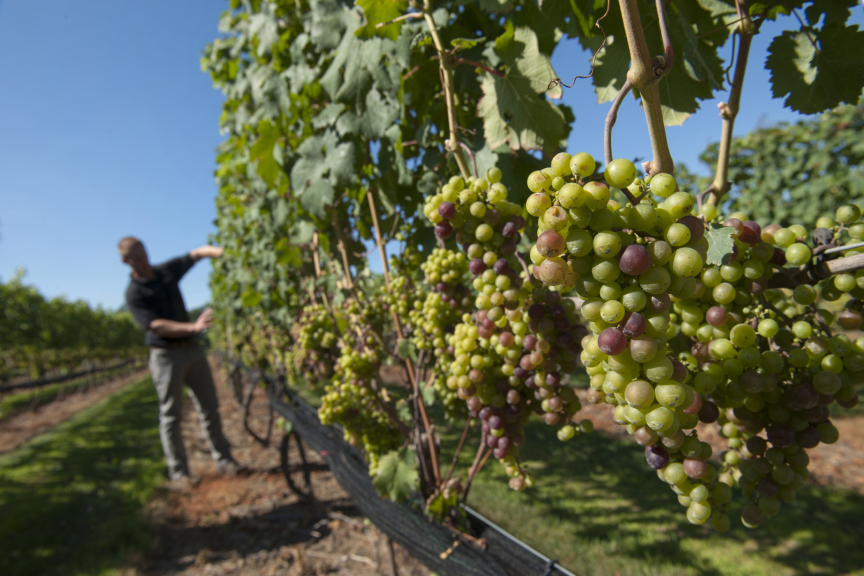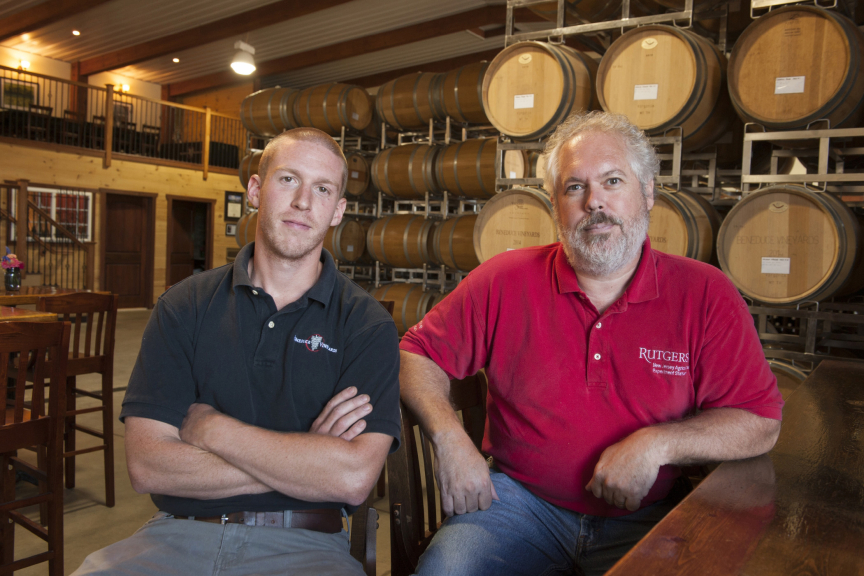Making New Jersey a Great Wine State
New Rutgers center provides science and expertise to help winemakers succeed

'Growers are realizing the great potential for making world-class wine here. We want to know what varieties work in what region and how best to grow them.'– Mike Beneduce
New Jersey isn’t known as a great wine state – at least not yet.
But it has all the right ingredients: affluence, proximity to major markets, a large wine-consuming population (the state ranked sixth in the nation in 2012), an amenable climate and proximity to the ocean that cultivates a rich soil for a growing wine industry.
Helping the state reach its full wine production potential – that’s where Rutgers comes in.
As more New Jersey farmers grow grapes for winemaking, Rutgers is playing a key role in that growth, providing the science and expertise to help them tap into an increasingly profitable sector in the state’s agricultural industry. Last year, the New Jersey Center for Wine Research and Education at Rutgers was launched to work in partnership with the industry to develop the best grape variety in the state.
“The wine industry in New Jersey is a small, young industry. It is also a dynamic, forward-moving enthusiastic industry,” said Daniel Ward, director of the New Jersey Center for Wine Research and Education, part of Rutgers New Jersey Agricultural Experiment Station, which has long provided expertise to farmers on crop management.
The timing for the Rutgers’ center is good. The wine industry is the fastest growing segment of New Jersey’s agricultural industry, said John Cifelli, executive director of the Garden State Wine Growers Association.
“We want to produce a higher quality of wine and we want more of it,” said Cifelli, who graduated from Rutgers’ School of Environmental and Biological Sciences (formerly Cook College) in 2009.
The Rutgers center will help coordinate the institutional resources needed to grow better grapes. The overall aim is to help farmers like Bill Heritage succeed at winemaking in the Garden State.
Heritage, a fifth-generation farmer in Gloucester County, said he tried his hand at winemaking because he had to do something to survive.
The fruit farm of peaches and apples was struggling in 2001 when he and his wife Penni decided to harvest grapes on two acres of unused farmland to make wine.
The following year, the couple made 500 bottles of chardonnay and sold the entire stock at $21 each. The vineyard now produces 20,000 cases of wine annually.
“I wanted to continue to farm,” Bill Heritage said. “Our farm was in the red. I wouldn’t be farming today without wine grapes.”
At the time of that experiment, Heritage didn’t know much about wines. He relied on a book, Wine Grape Production guide for Eastern North America, and tips from other growers in the state – only about a dozen then – to cultivate his 40-acre vineyard.

Now, the industry can also rely on the expertise from Rutgers.
Rutgers agriculture experts will work with the growers on varietal selections, cultivation techniques, pest and disease management, developing a business plan and marketing. Rutgers will provide the research – for example, which grape variety can survive New Jersey’s climate of harsh winter, early spring frost and the extreme summer heat and humidity.
Ward, who has an expertise in pomology (the science of growing fruit), has conducted research that shows that New Jersey growers would do well to develop blended wines for long-term economic sustainability and consistent, high-quality vintages. But the consumer isn’t quite there, he says, and it will be up to the industry to educate clients about the high quality of Jersey wine blends.
Until 1981, when the state eased the rules for winemakers to start a business, New Jersey had only eight wineries. As of April, there were 51 licensed wineries in New Jersey, according to the state Department of Agriculture.
In 2014, the state ranked 13th in the nation in wine production, with nearly 1.5 million gallons of wine produced.
Mike Beneduce, winemaker and vineyard manager at Beneduce Vineyards, Pittstown, Hunterdon County, said New Jersey vintners have realized that collaboration – not competition -- helps their industry grow. “We’re better doing this together than separately,” he said.
That’s why the group reached out to the Rutgers Cooperative Extension, asking Rutgers to create the center to better serve the New Jersey wine industry.
“Other growers are realizing the great potential for making world-class wine here,” said Beneduce. “We want to know what varieties work in what region and how best to grow them.”
An advantage for the state’s winemakers is New Jersey’s diverse soil, allowing the industry to grow a wide selection of grapes.
“There are three main types of grapes for wine making and they all grow well in New Jersey; this is the beauty,” Ward said. The wines produced in the southern part of the state, for example, compare well to the global varieties in regions like Bordeaux in France.
The grape produced most in New Jersey is chardonnay, but chardonnay doesn’t define the state’s wine industry. Other wine regions have focused on growing a particular variety of grape to create a wine identity. Oregon has its pinot noir; Long Island, merlot; and California, cabernet.
“New Jersey is not likely to do that because we’re not an export market,” Ward said. “We’re serving a diverse, local clientele so we need a diversity of wines.”
At Heritage Vineyards, they grow chardonnay as well as merlot, cabernet sauvignon, cabernet franc, syrah, malbec, and first time this year, semillon.
The industry is still in the infancy stage of what can become a booming market. It takes time and patience, which may be the industry’s biggest challenge now, Cifelli said.
“It takes 15 to 30 years to put your footprint on the wine world,” Heritage said. “It took 30, 40 years for Napa Valley to do what it’s doing today.”
New Jersey wines are getting noticed. They are winning international and national awards. In 2012, the Judgement of Princeton, a blind-tasting competition pitted New Jersey wines against top French wines. New Jersey held its own in the competition. “Both French judges preferred NJ red wines over their counterparts from Bordeaux,” the American Association of Wine Economists reported then. “After disclosing the wines’ identity, the French judges were surprised but did not complain.”
That’s how New Jersey will make its mark in the wine world, Ward said.
“We need to produce high-quality wine,” he said. “We need to sell high-quality wine at top prices. That’s what we need to be successful as an industry.”